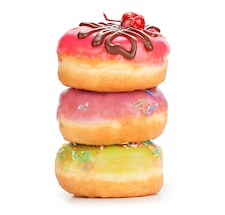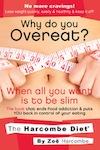Most of us focus on the ‘what’ of overeating but often it’s the ‘why’ we need to think about, says nutritionist and obesity researcher Zoe Harcombe. In her new book, Why do you overeat? When all you want is to be slim (Abacus £9.99), she has identified the human emotions that lead to overeating. Here’s a taste
Surprise With eating, it is almost certainly the lack of surprise in our daily lives that makes us eat. Lack of surprise is of course boredom. How often do you eat because you are bored? You’re in a dull meeting and the lunch sandwiches arrive and in you go. You are waiting in a queue, in traffic, to collect the children, for someone to arrive and I bet you think of food way more than even you normally would. You are bored. You are lacking surprise in your life.
Distress Extreme distress stops people eating. When people suffer bereavement, or the end of a relationship, they suffer extreme distress and often eat considerably less than they would normally. It is the milder and more regular distress that we suffer day to day that drives us to eat for emotional reasons. Another word for distress is sadness. When we are generally sad, as opposed to the huge trauma of loss, we tend to eat for emotional reasons. We eat to cheer ourselves up. But it doesn’t work. When we eat, we don’t just deal with sadness. A lot of other emotions come into play. We feel the initial high of the food getting into our bodies (or literally the blood glucose level rising in our bodies, as we now understand) but the more we eat the guiltier we feel. The angrier we feel at ourselves, the more disappointed and so on. We feel all kinds of emotions but we rarely feel cheered up, which was the reason for eating in the first place.
Anger There is actually a physical reason why we eat when we are angry. Anger triggers the ‘fright, flight, fight’ mechanism in our bodies. The anger physically causes adrenalin to be released into the blood, because the body is getting ready to deal with the crisis and to help us ‘fight’ or ‘flight’ (run away). The problem is, when we are sitting in our cars and we experience road rage (either ourselves or against us), the fright, flight, fight mechanism works beautifully. The body gets itself ready for the fight or for running away, and yet nothing happens. We rarely confront the other driver, so all the adrenalin that was there ready for the battle has nowhere to go. It sits within us instead and we just have to live with the rage. Physically and emotionally we are now heading towards a huge urge to eat. Physically our blood glucose level is just about to drop, because the adrenalin rushing around has not been dealt with. Emotionally we have all this rage that has not been dealt with and it turns inwards instead. We feel so angry and yet we have not had a chance to get even. We get even with a box of chocolates or a packet of biscuits instead.

Interest We eat out of curiosity. We eat because we want to know what something tastes like. If we have eaten chocolate cake before, we want to see what this particular chocolate cake tastes like. We need to stop wondering what everything tastes like. By all means experiment, but with real food. Create recipes. Try new varieties of meat, fish, cheese or vegetables. Try mixing things together – you can indulge your interest in food without eating junk.
AM I AN EMOTIONAL OVEREATER? How to identify whether you eat out of something other than real hunger
First rule out overeating for physical reasons such as candida or a yeast overgrowth in the gut, a food intolerance to substances such as wheat or lactose and hypoglycaemia where blood sugar regular drops and causes cravings. A naturopath or nutritionist can help you rule out or treat these conditions. Once you’ve ruled out physical overeating, then you know it’s emotional.
Confirm this with a food diary. Write down everything you eat and drink for a week including what you ate and how you felt just before you ate or drank it. You’ll spot patterns within a few days. This could be boredom mid-morning that leads to a muffin, a weekly deadline through which you keep going by inhaling lots of dirty chocolate or someone being rude to you that you bury inside only to try to soothe it with some wine and crisps later on. Becoming aware of the emotional patterns and connections you hold to food is often the first crucial step to breaking the patterns.
HOW TO CHANGE There is a change technique called ‘Four mind levels’ and it works well for changing overeating patterns. Level one is known as unconscious incompetence – you don’t know that you are doing something wrong. Level two is conscious incompetence – you have become aware of the fact that you are doing something wrong. Level three is conscious competence – you start getting it right, but you have to work at it. Level four is unconscious competence – it’s second nature for you to get it right without even thinking about it.
First, become consciously incompetent. The food diary will start you on the right track and then be alert to every time you are reaching for food that you don’t need and that will sabotage your healthy eating efforts.
Then move to conscious competence. This is about knowing that you are about to eat a muffin because you’re upset and you can choose not to. When the food diary and your new alertness to your eating gives you information about which emotions are the main triggers for you – write a list for alternative ways of dealing with each one. For example, when I get stressed at work: I will pop outside for a breath of fresh air; I will go to the kitchen and make a calming cup of herbal tea; I will find an excuse to pop over to so-and-so’s desk, as they always cheer me up; I will promise myself a tea break if I can just work through for another half an hour.
Whatever emotional question our mind is posing – food is never the right answer. It may give a temporary lift, inevitably followed by a blood glucose and energy low, irritability, inability to concentrate and you’ll be beating yourself up for giving in and falling off the track to being the slim and healthy person that you want to be.
As Ekhart Tolle says in the brilliant book The Power of Now, ‘Become the watcher’. Until you can spot yourself doing things you don’t want to do anymore you can’t correct yourself and do things right.

Like this article? Sign up to our newsletter to get more articles like this delivered straight to your inbox.




















































